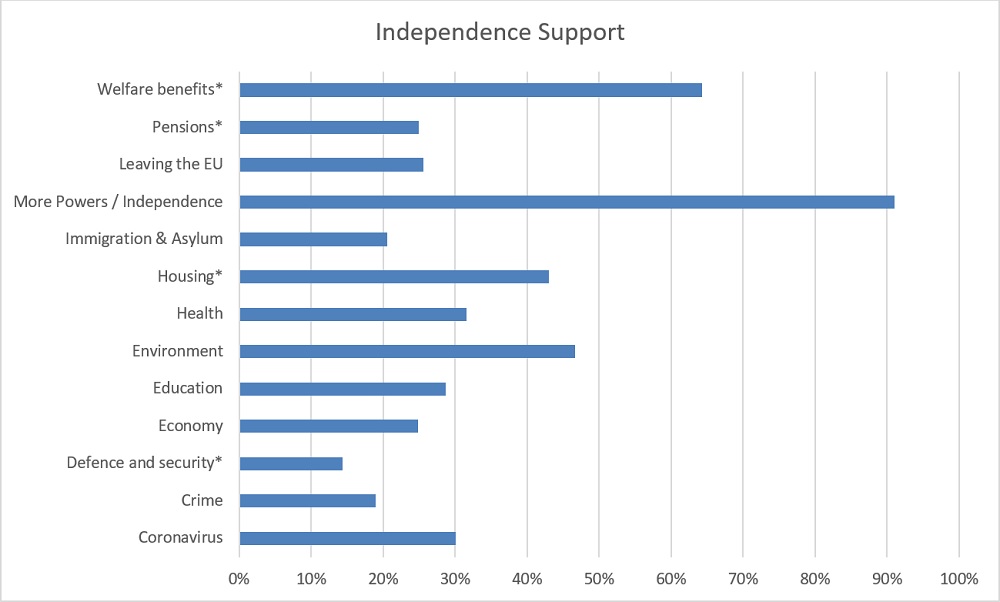What does the new YouGov poll tell us about who supports Welsh independence – and why?

Dafydd Trystan
The latest YouGov polling in Wales quite rightly hit the headlines given that it was the first poll to find a majority (albeit by the slimmest of margins) of Labour voters supporting independence.
But the poll also offers lots more insight into who supports independence, who is not yet convinced, and who is relatively hostile to independence.
[Note: For each poll the Don’t Knows and Would not Vote are excluded from the headline figures, in August 2020 16% Did not Know how the would vote, and 5% said they would not vote]
| Nov 19 | Jan 20 | Aug 20 | |
| Yes | 28 | 27 | 32 |
| No | 72 | 73 | 68 |
Firstly, the latest poll confirms a modest yet positive shift towards supporting independence over the past 6 months.
We can also see this pattern when we analyse the data on feelings towards independence – here respondents are asked to rate their feelings on a 0-10 scale.
| Nov 19 | Aug 20 | |
| Anti-Independence (0-3) | 48% | 46% |
| Indy-curious (4-6) | 30% | 23% |
| Indy-confident (7-10) | 23% | 31% |
If anything the pattern is more striking here with those who are against independence remaining broadly the same, but an apparent significant shift amongst those who previously ‘indy-curious’ to be rather more ‘indy-confident’.
How are these changes reflected in the patterns of support for Independence across different groups?
When we look at these data we must do so with some caution. Because some groups are relatively small we cannot be confident that the difference between 33% and 37% is significant, however if we were to find a difference between say 10% and 50% we could be far more confident that there is a genuine difference.
‘Yes’ vote by group:
| Group | ‘Yes’ Vote Aug 20 |
| Labour voters (2019) | 51% |
| Conservative voters (2019) | 9% |
| Lib Dem voters (2019) | 33% |
| Plaid voters (2019) | 58% |
| Remain voters (2016) | 45% |
| Leave voters (2016) | 21% |
| Males | 28% |
| Females | 37% |
| 18-24 | 43% |
| 25-49 | 42% |
| 50-64 | 29% |
| 65+ | 19% |
| Middle Class (ABC1) | 31% |
| Working Class (C2DE) | 34% |
The most striking finding here is that Labour voters from 2019 (51%) are almost as likely as Plaid voters (58%) to support independence. There is also significantly higher levels of support amongst those who would like to see Wales Remain in the European Union.
Amongst men and women, though the differences are more modest, it appears that women are more supportive of Welsh independence.
Meanwhile, the class profile suggest little difference in support, in contrast to the age profile, which suggests that voters under 50 are well disposed towards independence, whilst pensioners remain one of the groups least supportive of independence.
Significant
The poll also asked respondents which were the most important issues facing the country (offering a chance to pick up to three issues):
| Coronavirus | 54 |
| Economy | 42 |
| Leaving the EU | 34 |
| Health | 30 |
| Immigration & Asylum | 20 |
| Education | 19 |
| Environment | 17 |
| Crime | 10 |
| Housing | 8 |
| Welfare benefits | 6 |
| Pensions | 6 |
| Independence for Wales | 6 |
| Increased powers for Wales | 5 |
| Defence and security | 5 |
| Family life & childcare | 4 |
| Tax | 3 |
| Transport | 3 |
It may be somewhat of a surprise that only just over one half of respondents chose Coronavirus of the most important issues facing the country. The poll also shows that issues around Brexit remain salient, while the relatively high figures for Immigration and the Environment may be somewhat unexpected.
We can also look at the views of people who see issues as important on independence.
Here the caution on small numbers for some categories is repeated, but again we find a clear pattern.
For those who believe that crime, defence and immigration are amongst the most important issues facing the country, support for independence is low. For those who believe that health, education and coronavirus support for independence is around average (just below a third).
But for those who list issues such as the environment, housing, welfare benefits; a group of what might be described as ‘progressive’ causes, support for independence is higher than the average – in some cases significantly so.

So who does support independence? The evidence suggests that the strongest support for independence comes from Labour and Plaid voters, Remainers, voters under 50 and those who are concerned about housing, welfare benefits and environmental issues.
The poll also demonstrates clearly that independence is a position supported by a significant minority of voters in virtually every group. Furthermore, the data on ‘indy-curiosity’ and ‘indy-confidence’ suggests that there is further growth possible and fruitful campaigning territory for YesCymru.
Support our Nation today
For the price of a cup of coffee a month you can help us create an independent, not-for-profit, national news service for the people of Wales, by the people of Wales.






